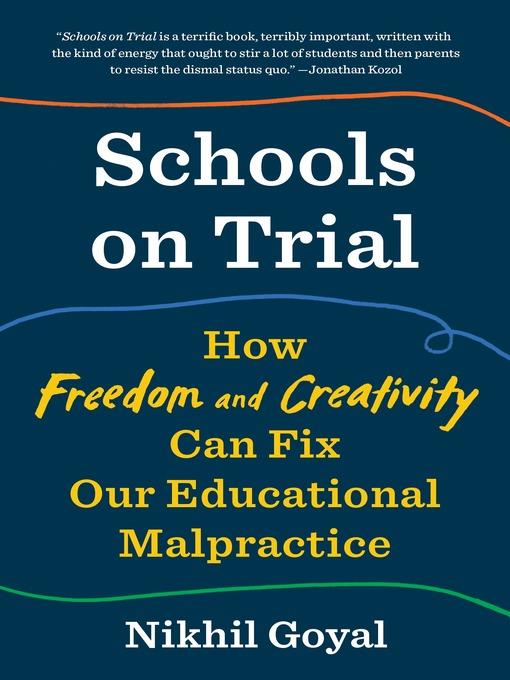
Schools on Trial
How Freedom and Creativity Can Fix Our Educational Malpractice
کتاب های مرتبط
- اطلاعات
- نقد و بررسی
- دیدگاه کاربران
نقد و بررسی

February 15, 2016
Goyal, a 20-year-old education reform activist and the 2013 recipient of the Freedom Flame Award, criticizes America's traditional schools, with their heavy focus on grades and standardized testing, and argues in favor of educational apprenticeships, maker schools that emphasize project-based learning, and democratic free schools that reject grades and required classes in favor of "play and self-directed learning." Goyal convinces readers that American students are stressed out, overworked, subjected to extreme standardized testing, and disengaged from learning, but some of his proposed alternatives don't seem tenable. The workshop or maker programs implemented in schools, libraries, and museum across the U.S. seem to be economically and racially diverse, but the high price tag on some of the "free schools," with one charging as much as $18,000 a year for preschool and another more than $25,000 a year for K-12, places them out of reach for many families. Goyal argues that traditional schools increase bullying and depression because students' creativityâand their voicesâhave been squelched out of the classroom. Depressingly for a book that argues about the need to hear from students, Goyal's work includes few comments from students of color (the students most likely to be victimized by schools' strict disciplinary policies). Ultimately, the book's meticulous research and detailed examination of the history of the American educational system drown out the words of those affected most: the students.

December 15, 2015
A journalist argues that conventional schools are oppressive, anti-democratic, and even harmful to children. Goyal (One Size Does Not Fit All: A Student's Assessment of School, 2012), currently an undergraduate at Goddard College, likens schools to prisons, where inmates are "cut off from the rest of society, stripped of your basic freedoms and rights, like free speech and free press, told what to do all day, and surveilled dragnet style." He bases that harsh indictment on his own recent, frustrating experience at a well-regarded Long Island high school; three years spent visiting schools and interviewing students, administrators, and teachers; and reading works by John Holt, Jonathan Kozol, Ivan Illich, and George Dennison, famous advocates of education reform in the 1960s and '70s. Unhappy students offer Goyal ample evidence "that schools are exhausting the gifts of creativity, curiosity, and zeal" that the author believes every child possesses. Happy students attend unconventional schools such as Brightworks in San Francisco (49 students, with tuition of $25,095); Sudbury Valley School in Framingham, Massachusetts (150 students, and a top tuition of $8,400 per year); and Brooklyn Free School, with 82 students and tuition ranging from $18,000 per year for preschool to $22,000 per year for high school. Goyal admits that these schools are tiny compared with the huge public school population, and because they charge tuition, they "generally attract students from upper-middle-class and affluent families," the population Goyal seems most familiar with. He has little to say about the needs of disadvantaged students. All students, he insists, should pursue their "passions and interests," preferably outside of classrooms. "The ultimate dream," he writes, "is for the city and community to be reimagined as the school itself," where students would take advantage of libraries, museums, community centers, and even coffeehouses, learning "however, whenever, whatever, and with whomever they choose." A heartfelt but limited-scope plea for systemic change from a determined gadfly.
COPYRIGHT(2015) Kirkus Reviews, ALL RIGHTS RESERVED.

March 15, 2016
Journalist Goyal offers a scathing review of modern education. Comparing schools with prison camps, the author contends that the controlling and inhumane structures of schooling have crushed children's spirits and led to the rise of ills such as bullying. Using his own experience and applying nontraditional models, Goyal advocates for an open, democratic, progressive form of education. At the heart of his paradigm is the understanding that children learn best through play, unfettered exploration, creativity, and freedom. Throughout, the criticisms leveled against public education are overtly harsh, yet within them lie grains of essential truth. Goyal wants to make clear the dark underbelly of education, but his arguments often lack the depth and full context needed to show the genuine complexity of the problem. In the end, his assertions also fail to illustrate how alternative systems produce practical change. Goyal's accounts are illuminating; however, other titles such as Ken Robinson and Lou Aronica's Creative Schools and Tony Wagner's Creating Innovators offer an evenhanded approach that is more convincing. VERDICT For readers seeking an emotional appeal for education reform in an intimate, journalistic style, who are then willing to go elsewhere for greater context. [See Prepub Alert, 8/31/15.]--Rachel Wadham, Brigham Young Univ. Libs., Provo, UT
Copyright 2016 Library Journal, LLC Used with permission.

October 1, 2015
Goyal criticizes the American education system from an up-close and personal space, having been 17 years old when he wrote One Size Does Not Fit All: A Student's Assessment of School; now he is just 20. In the interim, he's received numerous awards and been called a future education secretary by the Washington Post. Here he decries the teach-to-the-test environment as inimical to the love of learning.
Copyright 2015 Library Journal, LLC Used with permission.

























دیدگاه کاربران